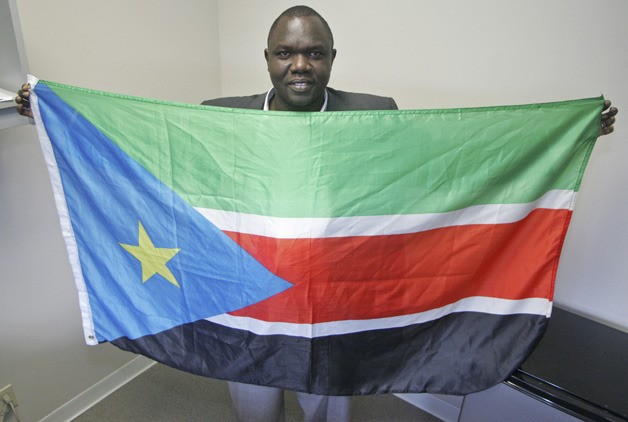Vincent Oywak fled from a war-torn Sudan to make a better life for himself and his family in the United States.
“I left because of the war; it was mainly about safety,” Oywak said. “Staying put was just not an option for me, but leaving was just hard. I travelled alone a lot.”
Oywak travelled by foot, train and plane to many places including Egypt, Italy and Iraq. He arrived in Washington state in 1998.
“I love living in the United States because I get peace and the opportunity to grow in an atmosphere where my kids have access to good schools, healthcare and a free society where they can grow up in and explore their own opportunities.”
Oywak just returned from the Republic of South Sudan. He is a manager for the Sudan Microfinance Institution (SUMI) stationed in South Sudan and he works there for six months every year.
“Sudan Microfinance Institution’s objective is to offer financial services on a self-sustaining yet efficient basis to micro-entrepreneurs living in southern Sudan, with emphasis on the agriculture sector, women, returned refugees, and internally displaced persons,” Oywak explained. “I am honored to be a part of it because I think it is essential to help rebuild our newly declared country.”
The Republic of South Sudan became an independent country on July 9 of this year. Oywak was working in South Sudan when he heard the news.
“It was so exciting, just a historical and emotional event to see,” he said. “Our parents and generation of family members waited for this moment to happen, so it is so great to see it happen in my lifetime.”
Although the Republic of South Sudan is now independent, it is still a conflicted country in need of much. Oywak believes SUMI is a great step in providing help to the people.
“It is essential to provide the people with financial education and help,” he said. “Providing micro-loan knowledge to people has the potential for them to establish their own business, eliminate poverty and become self-sufficient.”
Given the lack of infrastructure, few businesses, no legal or regulatory framework, and a culture of heavy dependence on relief aid brought on by a quarter century of war, few thought a microfinance institution could be developed.
“Despite everything, I had no doubt it would be a great benefit to our country and a great success,” Oywak said. “Our country relies almost 100 percent on imports right now. This is something we need.”
Created with USAID support in 2003, SUMI is performing above inter-national standards and growing. Through solidarity groups and salary loans in three southern Sudan branches, the total value of loans disbursed by February 2005 was close to a half million dollars to more than 1,600 clients, above the targets set in their business plan.
SUMI’s repayment rate is over 98 percent with a portfolio-at-risk rate of less than 6 percent, according to USAID’s website.
“In five years, I see this business helping our country become stable,” Oywak said. “I want us to develop infrastructure, health services through building a local credit union model that promotes local ownership.”
The population of the Republic of South Sudan is around 12 million, which is small in comparison of the land mass, Oywak said.
“Our country is actually blessed with an abundance of resources, so there are many opportunities ready for people to take,” Oywak said. “There is considerable interest for people to return from the United States, however, the lack of basic services is an impairment for mass return. Many problems are related to poor infrastructure, high illiteracy rates, high mortality rate, malaria and waterborne diseases.”
Oywak thinks that if the country becomes stronger, many refugees will come home.
“If people know they can comfortably live here, or can help our country, they will return,” he said. “The challenge of building our country is enormous, but we hope to learn from other places on what to do, including the United States.”
Talk to us
Please share your story tips by emailing editor@kentreporter.com.
To share your opinion for publication, submit a letter through our website https://www.kentreporter.com/submit-letter/. Include your name, address and daytime phone number. (We’ll only publish your name and hometown.) Please keep letters to 300 words or less.

